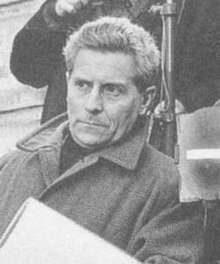Georges Franju
| Georges Franju | |
|---|---|
 |
|
| Born | 12 April 1912 Fougères, France |
| Died | 5 November 1987 (aged 75) Paris, France |
| Occupation | director, screenwriter |
| Years active | 1934, 1949–1978 |
Georges Franju (French: [fʁɑ̃ʒy]; 12 April 1912 – 5 November 1987) was a French filmmaker. He was born in Fougères, Ille-et-Vilaine.
Before working in French cinema, Franju had several different jobs. These included working for an insurance company and a noodle factory. Franju was also briefly in the military in Algeria and was discharged in 1932. On his return, Franju studied to become a set designer and later created backdrops for music halls including Casino de Paris and the Folles Bergère.
In the mid-thirties, Franju and Henri Langlois met through Franju's twin brother Jacques Franju. As well as creating the 16 mm short film Le Métro, Langlois and Franju also started a short-lived film magazine and created a film club called Le Cercle du Cinema with 500 francs he borrowed from Langlois' parents. The club showed silent films from their own collections followed by an informal debate about them amongst members. From Le Cercle du Cinema, Franju and Langlois founded the Cinématheque Française in 1936. Franju ceased to be closely related with the Cinématheque Française as early as 1938, and only became associated with it strongly again in the 1980s when he was appointed as the honorary artistic director of the Cinématheque. In 1937, Franju and Langlois co-founded another less successful film journal titled Cinematographe which had only two issues. In early 1940, Franju and Dominique Johansen co-founded another organization to promote cinema called Circuit Cinématographique des Arts et des Sciences which closed on 31 May 1940.
In 1949, Franju began work on a series of nine documentary films. The Nazi occupation of Paris and the industrialism following World War II influenced Franju's early works. His first documentary, The Blood of Beasts (French: Le Sang des Bêtes) was a graphic film of a day inside a Paris slaughterhouse. The second documentary, commissioned by the government in 1950, was Passing By the Lorraine (French: En Passant par la Lorraine). The film was commissioned as a celebration of the modernization of the French industry, but Franju's film showed his view of the ugliness spewing forth from monstrous factories. Franju's third film commissioned by the French government, Hôtel des Invalides (1951), was a look at life inside a veterans' hospital. The film was commissioned as a tribute to the hospital and the War Museum, but Franju turned it into a film against the glorification of militarism. Franju later said that Hôtel des Invalides was his favorite of his three "slaughter" films.
...
Wikipedia
